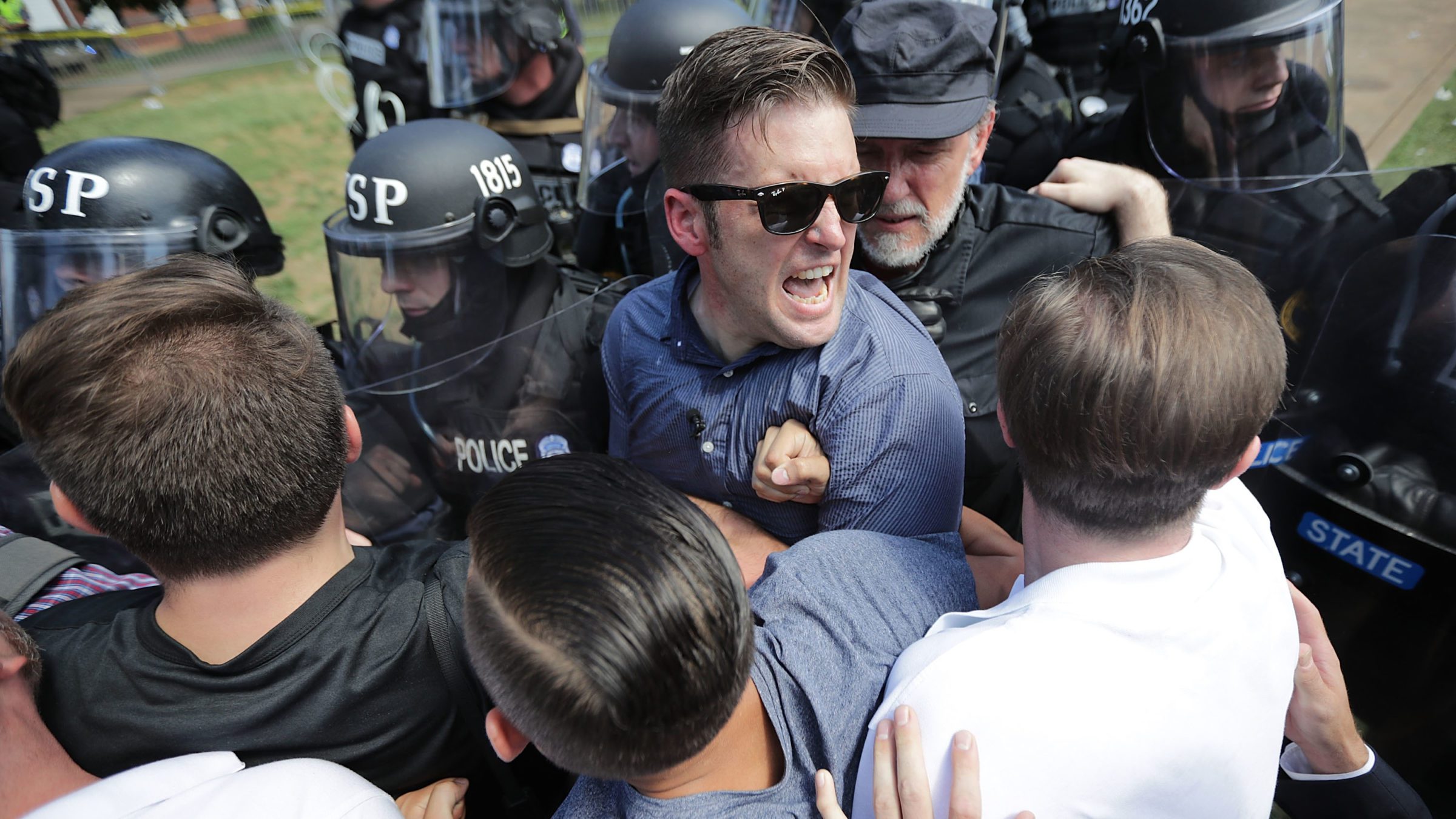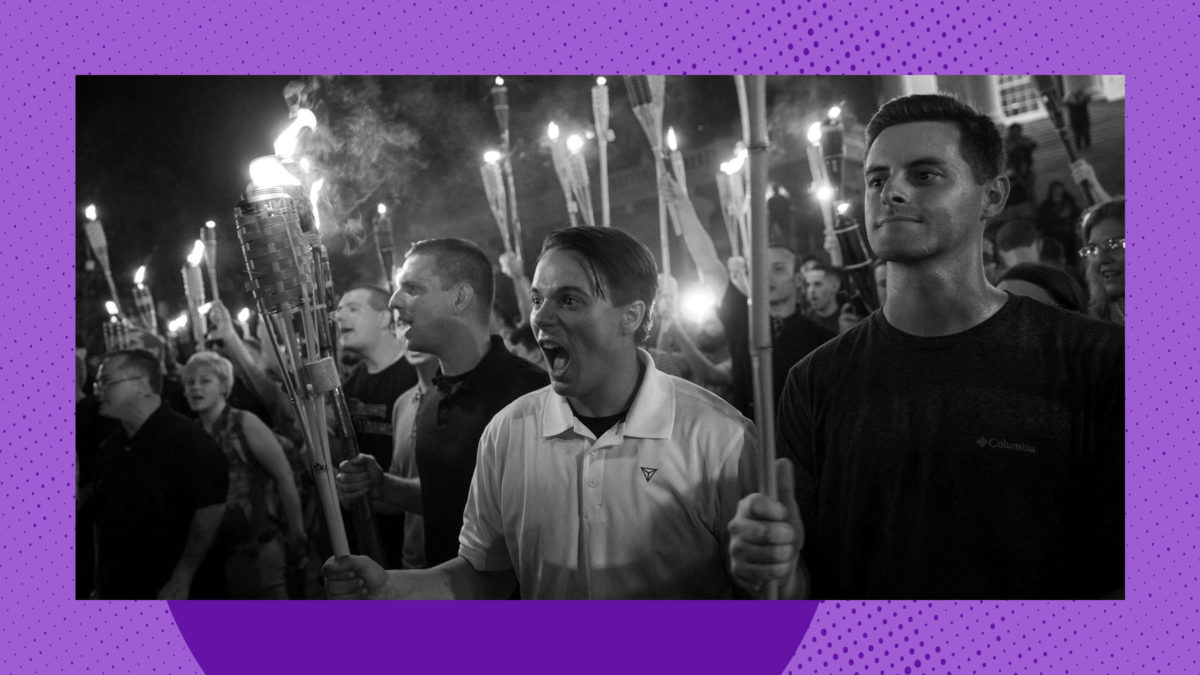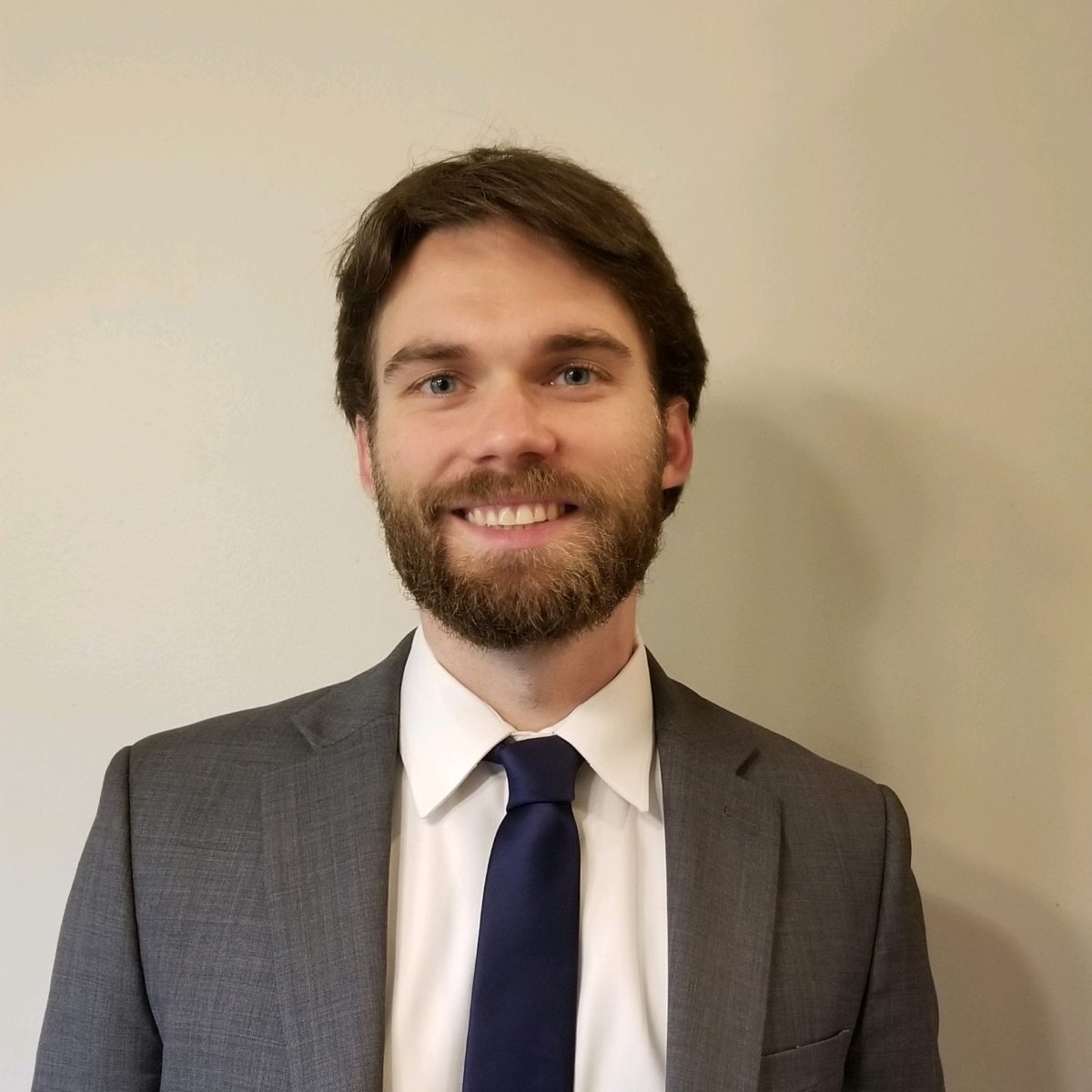Many prominent liberal lawyers are worried about white supremacists. Specifically, they’re worried that America’s racists need more legal help.
These attorneys, joined recently by University of San Francisco School of Law professor Lara Bazelon in an essay for The Atlantic, take issue with the American Civil Liberties Union’s 2017 decision to issue new case selection guidelines. The guidelines, which imposed soft limits on the ACLU’s traditional policy of defending the First Amendment rights of everyone from civil rights activists to Klan members, came after the ACLU helped white supremacists obtain a permit for the disastrous 2017 Unite the Right “rally” in Charlottesville, Virginia, where rallygoers killed one counterprotestor and injured several dozen more.
The ACLU’s guidelines acknowledge the dilemmas faced by lawyers at an organization that attempts to simultaneously advocate for white supremacists and the targets of white supremacist hate. The guidelines caution against representing armed protestors of any ideological persuasion going forward. They (somewhat awkwardly) reserve attorneys’ right to criticize the substance of the client speech they are defending. And although they do not outright bar ACLU attorneys from representing anyone, they urge careful consideration of the merits of advocacy that “may assist in advancing the goals of white supremacists or others whose views contrary to our values.”

White nationalist leader Richard Spencer at the 2017 rally in Charlottesville (Photo by Chip Somodevilla/Getty Images)
Bazelon, among other others, criticizes this as an unacceptable deviation from the ACLU’s noble, apolitical mission. The organization’s abandonment of its content-neutral client acceptance process, she argues, “will inevitably lead to a collective hush irreconcilable with the free marketplace of ideas and commitment to due process that are the hallmarks of our democracy.” She adds: “I look to the ACLU to defend everyone, including my ideological enemies.”
This stance is symptomatic of the cognitive dissonance afflicting many lawyers, professors, and commentators who are willing to harshly criticize the American legal system—Bazelon calls it “fundamentally unfair”—and yet urge faith in the system’s ability to deliver justice. The idea is that evenhanded operation of the law will ensure that white supremacists’ legal victories will also benefit their past, present, and future victims: people of color, the undocumented, labor organizers, queer activists, trans advocates, and the poor.
This argument imagines the American legal system as a West Wing episode: lots of passionate arguments resulting in a mutually beneficial consensus carefully crafted by neutral institutions. Like The West Wing, this vision is fictional. Providing free legal advocacy to white supremacists produces only one real-world result: white supremacist legal victories.
There is little reason to believe that police officers who already ignore court rulings will respect new legal protections established by white supremacist victories. American police have spent years flagrantly violating the First Amendment rights of Black Lives Matter protestors, indigenous activists, and undocumented people, among many others. During the protests over the police killing of George Floyd in 2020, a federal judge ordered Seattle police to stop using tear gas on protesters. Seattle police immediately violated it. The ACLU’s decision to help white supremacists obtain the Charlottesville permit in 2017 did not protect Virginia’s Black protestors and their allies in 2020. Instead, police gassed and beat peaceful demonstrators in Richmond before admitting the violence was “unwarranted” and settling for an undisclosed amount.
America’s courts are just as willing as its police departments to ignore legal rules they don’t like. Reactionaries are gleefully using a newly-packed court system to silence everyone from civil rights activists to sexual assault survivors, led by a Supreme Court that rejects the right to privacy. Activist judges are free to confine troublesome cases to their facts or ignore precedent entirely. An increasingly dysfunctional judiciary is unlikely to use white supremacist legal victories to benefit everyone (or anyone) else.
Perhaps most importantly, providing free legal advocacy to white supremacists requires the ACLU to deny free legal advocacy to others who desperately need it. Demand for the ACLU’s services is growing, and its attorneys do not have unlimited time or funding. Millions of people cannot speak freely right now, from queer Florida students prohibited from discussing their own lives to doctors unable to give medical advice to trans or pregnant patients. Undocumented and incarcerated people face perhaps even greater threats to their First Amendment rights. Given that most Americans cannot to pay for legal help, “defending everyone” is simply not a goal the ACLU can accomplish.
None of this is to suggest that the ACLU is perfect. Some of Bazelon’s criticisms—especially those that focus on the grubbier side of the organization’s fundraising efforts—have undeniable merit. But the question here is whether civil rights attorneys should effectively outsource their moral decision-making to a legal system they acknowledge is broken. Instead of trying to help marginalized people by fighting for their oppressors, the ACLU should simply cut out the middleman and fight directly for marginalized people.
Disclosure: Prior to law school, the author worked from May 2017 to August 2018 at Kaplan, Hecker & Fink LLP, which represented Charlottesville counterprotestors who sued rally organizers for conspiring to commit racial and religious violence. In 2021, a Virginia jury awarded the counterprotestors $25 million.

